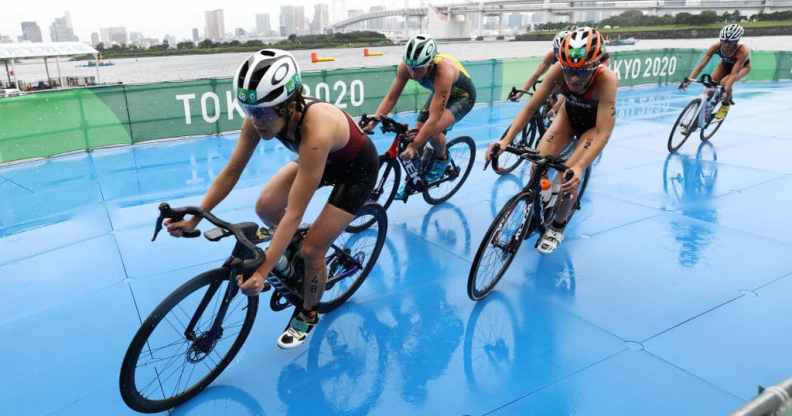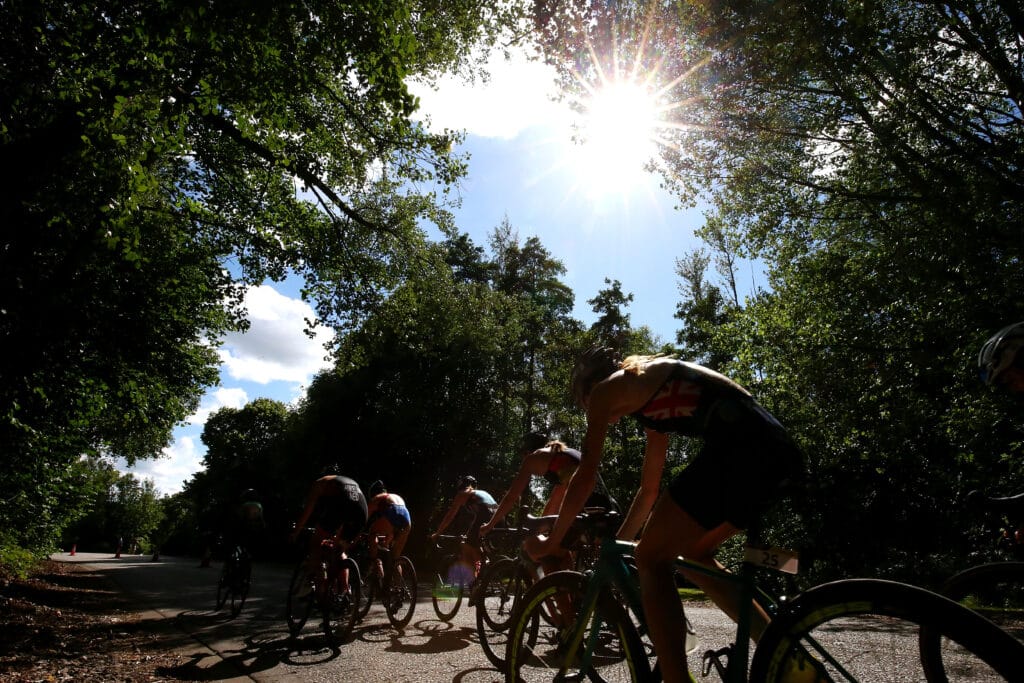British Triathlon announces ‘comprehensive’ review of trans athlete inclusion policy

Women’s individual triathlon at the Tokyo 2020 Olympic Games. (Getty)
British Triathlon has launched a review into its trans inclusion policy amid a toxic, ongoing debate over women’s sports.
Days after British Cycling suspended its trans inclusion policy, and with it all trans and non-binary cyclists from competitive races, British Triathlon has announced a review of its own.
The body, which governs triathlon, duathlon and multisport in the UK, confirmed to PinkNews that while the review is being undertaken, its 2018 trans inclusion policy “remains valid”.
“We have embarked on a comprehensive consultation process with key stakeholders including members, athletes, volunteers and professional bodies as part of a review of the 2018 policy,” a spokesperson said on Wednesday (13 April).
“We are also in regular dialogue with World Triathlon and other UK governing bodies. We intend publishing a new Trans Inclusion Policy as soon as possible after the consultation is complete.”
The initial announcement, made Monday (11 April), confirmed experts are also being engaged “to inform the ongoing work in developing a policy and appropriate guidance in relation to transgender inclusion in triathlon, aiming to be published later this year”.
“Inclusion, fairness and safety are all incredibly important topics and we are passionate about providing the opportunity for voices to be heard to help inform our policy review,” said British Triathlon CEO Andy Salmon.
“Triathlon is a sport that can be enjoyed by anyone and as a national governing body, British Triathlon understands its responsibility for promoting an inclusive environment with equitable treatment for everyone taking part.”
The news was cautiously welcomed by Mermaids’ director of operations and direct service delivery, Amy Gadd, who suggested that “gender critical” groups were being invited to take part in the consultation.
British Triathlon could not confirm “who is or isn’t involved” due to privacy reasons.
“We are pleased that British triathlon are looking at inclusion and we hope that this is a positive step towards a bigger future for trans people’s participation in the sport,” Gadd told PinkNews.
“We are disappointed however, to find that ‘gender critical’ organisations have been asked to participate in the consultation,” she continued.
“In reviewing their transgender inclusion policy we hope that British Triathlon puts the lived experience of transgender and non-binary people at the heart of the review. We look forward to an inclusive policy where trans young people are included and welcomed into the sport and able to thrive in it.”
What is British Triathlon’s trans inclusion policy?
According to British Triathlon, trans women over 16 “and post-puberty” can compete in female categories by “providing evidence that their hormone therapy has brought blood-measured testosterone levels within the range of their affirmed gender or that they have had a gonadectomy”.
Trans women wishing to complete as “elite athletes” must be undergoing “verifiable” hormonal therapy to “minimise gender-related advantages”, as per previous IOC rules which were in force when the guidance was written. A medical officer will assess all such applications.
There are no restrictions on trans men.

Athletes competing in the Women’s Triathlon of the European Championships Glasgow 2018 in Glasgow, Scotland. (Jack Thomas/Getty Images)
Trans women who are not on hormone therapy, may “compete in any male or mixed-sex” tournaments.
Hormonal therapy as a requirement to play certain sports is “unnecessary, humiliating and harmful”, the United Nations has said.
Trans girls are handled on a “case by case” approach.
The British Triathlon’s page on “gender reassignment” in relation to its inclusivity rules says that the body is still “taking some time to digest” 2021 guidance by the Sports Councils Equality Group which argued for separate categories for trans athletes.
The guidance was slammed by trans athletes for suggesting that inclusion and “competitive fairness” are incompatible.
In November 2021, the International Olympics Committee dropped its policy on trans inclusion, saying that sports should instead set their own rules.
The 17-year-old IOC policy centred around setting limits on the testosterone levels for female athletes, but officials said that after extensive research this is no longer considered the most important factor in determining whether trans women should be allowed to compete.
“One of the things I think the framework does is move us on from just considering testosterone,” IOC medical and scientific director Richard Budgett told OutSports. “It’s perfectly clear now that performance is not proportional to your endogenous, in-built testosterone.”
British Cycling suspended its trans inclusion policy on 8 April, pending a full review.
As a result, trans and non-binary cyclists cannot currently take part in competitive events in the UK. It came after trans cyclist Emily Bridges was barred from a women’s event at the British National Omnium Championships due to international rules, amid an anti-trans media storm over her inclusion in the sport.
The ACLU has warned that trans exclusion can invite “gender policing that could subject any woman to invasive tests or accusations of being ‘too masculine’ or ‘too good’ at their sport to be a ‘real’ woman” – much like what has happened to Caster Semenya, who has been banned from certain events unless she alters her natural hormones

